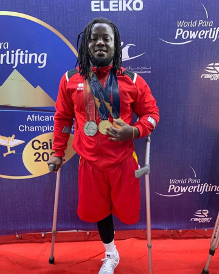The Power of the Broadcast in Dispelling Stigma and Encouraging Inclusion
Emmanuel Nii Tettey Oku with his medals at the World Para Powerlifting event in Cairo, 2022.
Emmanuel Nii Tettey Okuwas working as an electrical engineer and hobby body builder but following an accident in 2013 he had to have his left leg amputated and was faced with having to adapt to a new way of living. For some time, Emmanuel felt hopeless (and angry) as he could no longer work or be active as before. However, in 2016 he watched a broadcast from the 2016 Rio Paralympic Games and was excited to see people in wheelchairs lifting weights. It wasn’t until 2018 that a friend mentioned that he had seen some people doing disability sport at the Accra Sports Stadium, so he went along and met with the coach of the Para Powerlifting program, Coach Prince. Emmanuel started training straight away, “I fell in love with it. I gave it my all and now I am a national para-athlete.”
Emmanuel talks openly about the stigma that surrounds people with disabilities in Ghana, and Africa as a whole. He says, “people think you are useless and the only option for you is to be on the streets.” Through the confidence he has gained from taking part in Para Sport he now lets people know that begging on the streets is not the only thing and there are many opportunities available. “Para sport gives you inclusion, and then people give you some sort of respect as a disability person. I learned how to [accept my disability] and be humble and started living an independent life because I never knew I could do things for myself. I used to depend on my family, but I can literally say that they depend on me now. So, para sport has done a whole lot for me.”
Emmanuel plans to complete in the African Para Games that are due to held in Accra, Ghana this September with the hope that he can gain a qualification for the 2024 Paralympic Games in Paris. Whether he is successful or not, the journey from the Paralympic Games broadcast, through its power to dispel stigma and encourage inclusion, and on to promoting the benefits of sport to other disabled (and non-disabled) people is what the PSAS project is all about.
